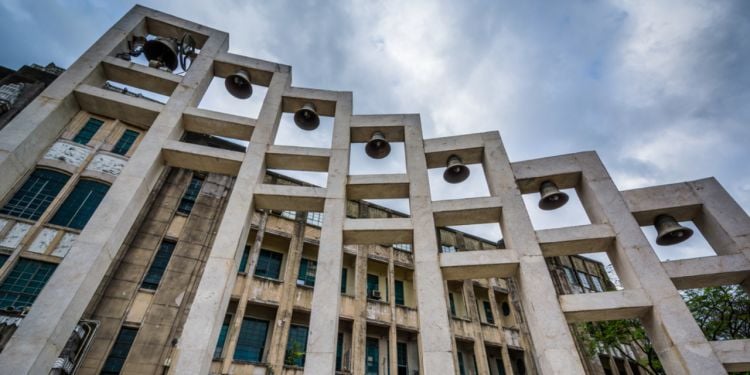Studying in Manila

With more than a hundred universities dotted around the city, Metro Manila is very much the center of higher education in the Philippines. A newly developing and emerging market in Asia, the Philippines has welcomed a steadily increasing number of international students in recent years aside from being a popular destination for the country's tropical and sunny beaches.
Studying in the Philippines has a number of advantages, such as the relatively lower cost of living as compared to the West, the fact that English is the main language for under-grad and post-grad courses, the warmth of the local people, and the emphasis, status and seriousness attached to education, especially higher education. Do not be surprised to see huge tarpaulin banners hanging from businesses or houses to celebrate a family member who has graduated!
Tuition fees in Manila vary depending on the number of units chosen. As of 2022, the Commission on Higher Education said that the national average rate of increase in tuition per unit is 4.74 percent (P29.15). The national average rate for other school fees is 10.61 percent (P50.51).
Read on to find out about the top universities in Manila, the programs being offered, and the costs.
The higher education system in the Philippines
Not only is the Philippines a beautiful country, but it also has one of the best higher education systems in Asia, with four Manila universities securing their spots in Times Higher Education's Asia University Ranking in June 2023. In the Philippines, there are almost 2,300 higher education institutions, the majority of which are private. Many universities are affiliated with the Roman Catholic Church, which reflects the country's past Spanish colonialism.
Top universities in Manila
The following four universities in Manila were included in the QS World University Rankings. In 2023, the University of the Philippines ranked the highest at 412, followed in second place by Ateneo de Manila University.
University of the Philippines
Of the public institutions funded by the government, the University of the Philippines (UP), deemed the national university, is the one that receives the most funding. It ranked 412th in the World University Rankings 2023 and is consistently referred to as the top university in the country. It is made up of seven constituent universities and a total of 15 campuses around the country. Its flagship campus is the University of the Philippines Diliman, which is located in Quezon City. To be able to enter this prestigious university, one would have to pass the University of the Philippines College Admission Test (UPCAT).
Good to know:
In 2018, the government passed a law making education free of charge up to the tertiary level, making tuition free for all public universities, including UP.
Ateneo de Manila University
Ateneo de Manila University (ADMU) is the third oldest school in the country, having been established in 1859 by the Society of Jesus. It is a co-ed, private university and ranks 551-600 in the QS World Ranking. Average tuition fees range from 160,000 pesos to 180,000 pesos per year for a 4-year course. ADMU is also a research institution known for its quality facilities, high accreditation and excellent faculty.
De La Salle University
De La Salle University (DLSU) is a trimestrial private university founded in 1911. It ranks 701-750 in the recent QS World Rankings and belongs among the top universities in the Philippines. DLSU has been identified by the Commission of Higher Education as a “center of excellence” in six of its programs. It offers degrees in Education, Engineering, Business and Communication, to name a few. Current approximative tuition fees stand at p205,000/ USD 3,708 to 225,000/ USD 4,067 per year for a Bachelor's Degree, p37,000/ USD 670 to 100,000/ USD 1,809 per year for a Master's Degree, and p110,000/ USD 1,990 to p205,000/ USD 3,708 per entire study period.
University of Santo Tomas
University of Santo Tomas (UST), also known as the Pontifical and Royal University of Santo Tomas, or the Catholic University of the Philippines, is the oldest university in both the Philippines and Asia, having been established in 1611. It is a private, Roman Catholic research university ranking 701 in the latest QS World Ranking. Tuition fees at the University of Santo Tomas are equal for locals and foreigners and start from p37,000/ USD 670 per year.
Other universities in Manila
Aside from these 4 top universities in the Manila area, there are also other great universities like the following:
The University of Asia and the Pacific
University of Asia and Pacific (UA&P) was originally a think-tank that offered graduate courses in economics. Some of the courses that it provides are Applied Mathematics, Human Capital Development and Industrial Economics. As of 2022, generally a semester at UA&P will cost between P95,000/ USD 1,718 to P146,000/ USD 2,640, depending on your course.
Enderun Colleges
Enderun Colleges is a non-denomination college specializing in Bachelor of Science in International Hospitality Management with emphasis on Hotel Administration and Culinary Arts. The college, located in Bonifacio Global City, also offers degrees in Business Administration, Entrepreneurship and Sustainability. Tuition fees range from p230,000/ USD 4,156 - p270,000/ USD 4,883 per year for local residents and p287,000/ USD 5,191 per year for international students.
Admission to Manila universities
To be able to get into these prestigious universities in Manila, one normally has to undergo admission examinations. Any student who wishes to enter UP has to take the University of the Philippines College Admission Test (UPCAT), the University of Santo Tomas Entrance Test (USTET) for UST, and the Ateneo College Exam Test (ACET) for ADMU. You have to secure notice of admission prior and submit the usual requirements, which include a high school card (Form 138), transcript of records, and certificate of good moral character. A health examination is also a common requirement to prove that all students admitted are physically fit. Most universities in Manila also offer various scholarships which can be availed by deserving students. Make sure to visit each university's website to be able to get the latest updates on each school's entrance procedures and requirements.
Student visas in Manila
You can apply for a student visa in the Philippines if you're at least 18 years old, have sufficient financial resources, and intend to take up a course higher than high school at a school accredited by the Bureau of Immigration.
Students must directly enroll with the Philippine university or higher education institution they have chosen, which will then submit the application to the Commission on Higher Education (CHED) for approval. If the answer is positive, the CHED will transmit its approval to the Secretary of Foreign Affairs, who will then allow the Consulate to issue the student visa.
Documents to be produced as listed by the Bureau of Immigration are the following:
- Letter request addressed to the Commissioner from the representative of the petitioning school;
- Duly accomplished CGAF (Consolidated General Application for Immigrant Visa) forms. If the applicant is a minor, it shall be signed by the parent or the legal guardian;
- Photocopy of passport bio-page and latest admission with valid authorized stay;
- Certificate of Acceptance issued by the learning institution accredited by the Bureau of Immigration to accept foreign students, indicating the number of months (length of study) of the technical/vocational, special and/or primary or secondary level courses for applicants below 18 years of age;
- Photocopy of BI school accreditation ID of the registrar or school representative;
- National Bureau of Investigation (NBI) Clearance, in case of flying schools;
- Bureau of Immigration Clearance Certificate.
The teaching language in Manila
English is generally used as the medium of instruction in Philippine universities. The UP Language Policy provides for the development and use of the Filipino language while maintaining English as a global lingua franca. Outside the lecture theaters, you may hear Tagalog spoken amongst your peers, but Filipinos are extremely friendly and will try to accommodate international students.
The learning environment in Manila
As mentioned, university places in Manila are treated with reverence and as a method to escape poverty and create a better life for Filipinos. Manila universities are said to be far ahead compared to provincial colleges in terms of quality of education.
Be prepared to wear uniforms if you're going to attend a private sectarian college and for block schedules (that is, your schedule is fixed, and you can't change it). The faculty (body of educators, i.e., professors or teachers) normally have an open door policy and are welcoming and helpful. Your chosen university should also have a dedicated international student officer/ department to assist you.
Working part-time as an international student in Manila
International students cannot partake in part-time work in the Philippines as this is not part of the special student visa. However, in special situations, a Special Work Permit (SWP) is the work permit that would need to be granted to international students who have short-term employment or work-related projects in the Philippines for upto 6 months.
Student accommodation in Manila
Your university will have student accommodation attached to the university or nearby. These ‘dorms' will be safer, communal and will have a University feel about them. Contact your International student officer for more information. If, however, you choose to live independently in Manila, as it is permitted, here is a list of useful rental websites to help you out:
You can also have a look at our article “Accommodation in Manila” for more information.
Health insurance for students in Manila
It it imperative to ask your University whether health insurance coverage will be provided during your studies in Manila. Otherwise, you will have to subscribe to additional health insurance.









